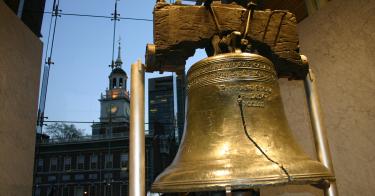What does it mean to be conservative?
Elections rarely come and go without many of us on the right debating that question. Sure, some of the discussions devolve into counterproductive food fights. But others are very healthy, and are just what you’d expect when dealing with such a vibrant, timeless governing philosophy.
American conservatism, it needs to be emphasized, is far different from the aristocratic conservatism of Europe, or the authoritarian conservatism of Latin America. Here are some of its canons:
Conservatives are highly suspicious of promised utopia and earthly salvation. The purpose of politics is not to gain redemption. It’s to carve out a system of justice under the rule of law, a moral order and freedom — recognizing that human beings are neither perfect nor perfectible.
When governments seek utopia, they end in oppression, because man and society are infinitely complex and cannot be reshaped by any institution of experts. To think otherwise, as F.A. Hayek wrote, is a fatal conceit.
Conservatives — whether traditionalist, libertarian, neocon or any other kind of conservative — understand that power is a zero-sum game. When power is assumed by government, it is lost by individuals. There must be a stopping point in every program and plan beyond which no government should be allowed to go, not merely because of budgetary concerns but because of the inevitable loss of freedom.
Conservatives believe there is an intimate connection between private property and freedom. Indeed, economic freedom is an essential part of human freedom. As the Heritage Foundation’s Index of Economic Freedom has documented for more than two decades, when given the chance, freedom works everywhere. It produces more prosperity and more freedom for more people than any other economic system.
Conservatives believe in the necessity of change, yes. But not in radical change based on abstract theories and the passions of the moment. They prefer settled institutions, values and traditions, reflecting what G.K. Chesterton called “the democracy of the dead.” They decline to follow the lead of any arrogant oligarchy who happen to be walking about. Such prudence, the philosopher Michael Oakeshott wrote, produces “the politics of repair” rather than “the politics of destruction.”
Many conservatives share a sense of reference, a belief in two worlds — one physical and one spiritual — that stand in judgment of our own. When the author Ralph de Toledano was sent proof sheets of a novel he had written, he noticed that his New York publisher had removed the capital letters from Heaven and Hell. Toledano corrected each and sent back the proofs. His publisher called and said, “Ralph, we have a set of style rules over here we must observe. Why do you insist on capitalizing Heaven and Hell?” Toledano replied, “Because they’re places. You know, like Scarsdale.”
According to George Santayana, there is a sentiment of gratitude and duty in the human spirit that we may call piety. That piety is common among almost all conservatives and sustains our respect for the living, the dead and yet-unborn.
These are some of the themes of American conservatism. I find all of them compelling and none of them contradictory. The danger comes when one conservative value becomes an absolute, something to which everything else is sacrificed. Conservatives usually avoid that danger, though, because of the aforementioned conservative virtue of prudence.
“What has sustained conservatives,” writes Lee Edwards in his essay “Can Conservativism Rise Again?” in the Winter 2017 issue of National Affairs, “is not their legions or their organizational skill or their use of the media or their fundraising prowess or even their persuasive leaders, but the power of their ideas — and the applications of those ideas to the problems of the day.”
Exactly. That’s why I always scoff at the periodic obituaries we see written for the conservative movement. It will always “rise again.” Like the reality it’s based on, conservatism isn’t going anywhere.
This piece originally appeared in The Washington Times




